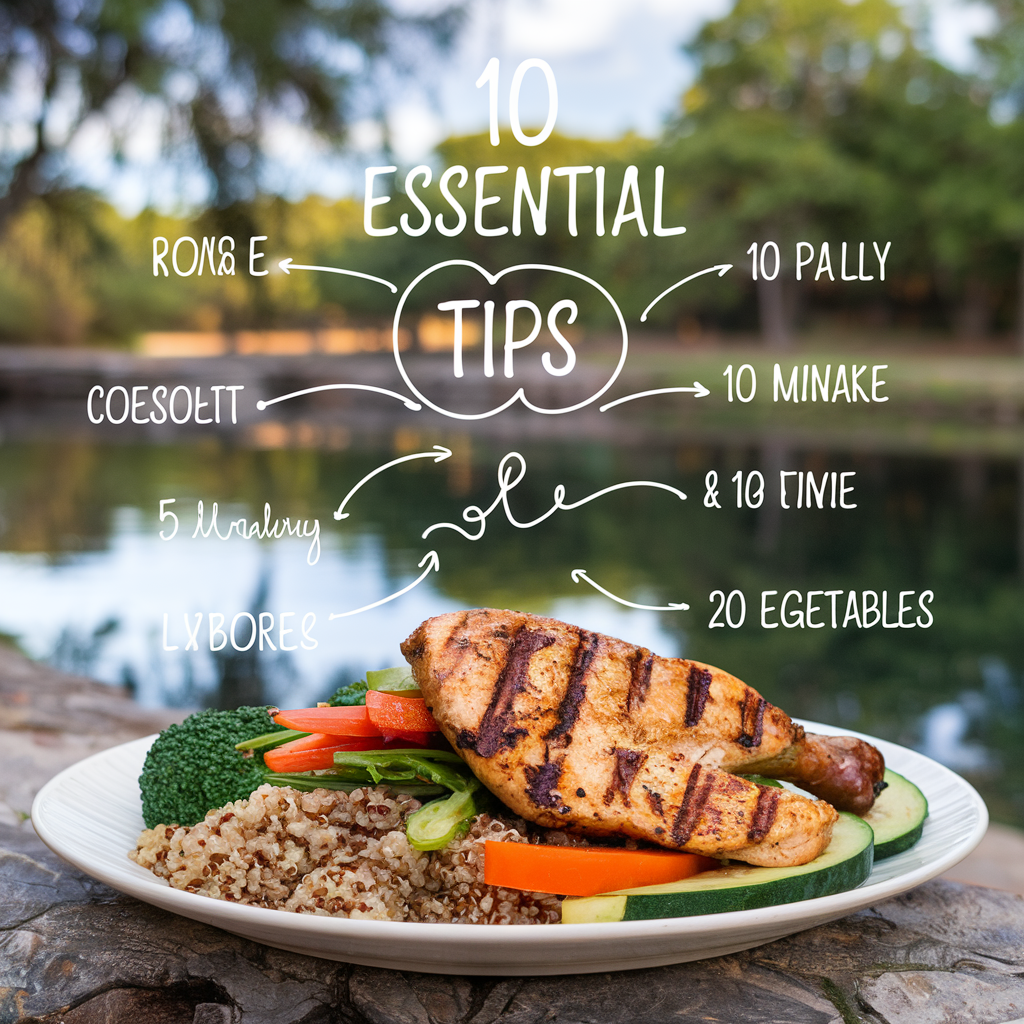Living a healthy lifestyle is not just about dieting or exercising; it’s about making informed choices that foster overall well-being. A balanced life includes not only physical health but also mental and emotional wellness. In our modern world, filled with distractions and unhealthy temptations, understanding how to maintain a healthy lifestyle is crucial. This article delves into actionable tips to help you cultivate a balanced life while steering clear of unhealthy habits.
Understanding a Healthy Lifestyle

A healthy lifestyle encompasses a variety of factors, including diet, exercise, sleep, stress management, and social connections. It involves adopting habits that promote physical fitness, mental clarity, and emotional resilience. This holistic approach not only enhances your quality of life but also reduces the risk of chronic diseases.
Key Components of a Healthy Lifestyle
- Nutrition: What you eat plays a vital role in your health. A balanced diet provides the necessary nutrients for energy, growth, and overall bodily function.
- Physical Activity: Regular exercise is crucial for maintaining a healthy weight, improving cardiovascular health, and boosting mental well-being.
- Sleep: Quality sleep is essential for recovery and overall health. It impacts mood, cognitive function, and physical performance.
- Mental Well-Being: Emotional health affects how we think, feel, and act. It’s vital to prioritize mental health alongside physical health.
- Social Connections: Strong relationships contribute to emotional well-being and can help you maintain healthy habits.
Tips for Achieving a Balanced Life

1. Prioritize Nutritious Eating
Nutrition forms the foundation of a healthy lifestyle. Here are some strategies to enhance your eating habits:
Focus on Whole Foods
Whole foods are minimally processed and retain their natural nutrients. Aim to fill your plate with:
- Fruits and Vegetables: Aim for a variety of colors to ensure a range of vitamins and minerals. Incorporate leafy greens, berries, citrus fruits, and cruciferous vegetables like broccoli.
- Whole Grains: Choose brown rice, quinoa, whole wheat bread, and oats over refined grains to increase fiber intake and sustain energy levels.
- Lean Proteins: Incorporate sources like chicken, fish, legumes, and tofu to support muscle health.
- Healthy Fats: Avocados, nuts, seeds, and olive oil provide essential fatty acids beneficial for heart health.
Practice Portion Control
Mindful eating is essential for avoiding overeating. Here’s how to practice portion control:
- Use Smaller Plates: This can trick your brain into thinking you’re eating more.
- Listen to Your Body: Pay attention to hunger and fullness cues. Stop eating when you feel satisfied, not stuffed.
Stay Hydrated
Water is vital for many bodily functions, including digestion and temperature regulation. Here are tips for staying hydrated:
- Drink Water Before Meals: This can help control appetite and aid digestion.
- Limit Sugary Drinks: Soda and sweetened beverages can contribute to weight gain and other health issues. Opt for water, herbal teas, or infused water with fruits.
2. Incorporate Regular Physical Activity
Exercise is a cornerstone of a healthy lifestyle. Here are ways to stay active:
Find Enjoyable Activities
Exercise doesn’t have to be a chore. Discover activities you enjoy, such as:
- Dancing: A fun way to stay active and express yourself.
- Yoga: Promotes flexibility, strength, and mental clarity.
- Team Sports: Engaging in sports can provide social interaction and make exercise enjoyable.
Mix It Up
Incorporate a variety of exercises to prevent boredom and work different muscle groups:
- Cardio: Activities like running, cycling, and swimming improve heart health.
- Strength Training: Lifting weights or doing bodyweight exercises like push-ups and squats builds muscle.
- Flexibility Exercises: Stretching or yoga can enhance flexibility and prevent injury.
Set Realistic Goals
Start with achievable goals to build confidence and motivation:
- Start Small: Aim for 10-15 minutes of activity per day and gradually increase the duration and intensity.
- Track Progress: Use apps or journals to log workouts and celebrate milestones.
3. Cultivate Mental and Emotional Well-Being
Mental health is just as important as physical health. Here are strategies to nurture your mind:
Practice Mindfulness
Mindfulness techniques can reduce stress and promote emotional balance:
- Meditation: Dedicate a few minutes each day to sit quietly, focus on your breath, and clear your mind.
- Deep Breathing Exercises: Take slow, deep breaths to calm the nervous system, especially during stressful moments.
Seek Support
Building a strong support network is essential:
- Connect with Friends and Family: Spend time with loved ones to foster connections that provide emotional support.
- Professional Help: If you’re struggling with mental health issues, don’t hesitate to seek help from a counselor or therapist.
Engage in Hobbies
Pursuing activities that bring you joy is vital for emotional health:
- Creative Outlets: Drawing, painting, or crafting can serve as stress relievers.
- Physical Activities: Gardening or hiking can provide both exercise and relaxation.
4. Get Quality Sleep

Sleep is fundamental to your overall health. Consider these tips for improving sleep quality:
Establish a Sleep Routine
Consistency is key for good sleep:
- Regular Sleep Schedule: Go to bed and wake up at the same time every day to regulate your body clock.
- Calming Bedtime Routine: Engage in relaxing activities, such as reading or gentle stretching, to signal your body that it’s time to wind down.
Create a Sleep-Friendly Environment
Your sleeping environment significantly impacts sleep quality:
- Comfortable Bedding: Invest in a good mattress and pillows that support your sleeping position.
- Limit Light and Noise: Use blackout curtains and earplugs to create a dark, quiet space.
5. Avoid Unhealthy Habits

Identifying and eliminating unhealthy habits is crucial for maintaining a balanced lifestyle:
Limit Processed Foods
Processed foods can contribute to health issues:
- Read Labels: Check for added sugars, unhealthy fats, and sodium.
- Cook at Home: Preparing meals at home allows you to control ingredients and portion sizes.
Reduce Stressors
Managing stress is essential for mental health:
- Identify Triggers: Recognize what causes you stress and work to minimize or eliminate those triggers.
- Time Management: Organize your tasks to avoid feeling overwhelmed.
Avoid Smoking and Limit Alcohol
Both smoking and excessive alcohol consumption can have detrimental health effects:
- Seek Help to Quit Smoking: Consider support groups or cessation programs.
- Be Mindful of Alcohol Intake: If you drink, do so in moderation. The CDC recommends no more than one drink per day for women and two for men.
Conclusion
Embracing a healthy lifestyle is a lifelong journey that requires commitment and mindfulness. By prioritizing nutritious eating, incorporating regular physical activity, nurturing mental well-being, ensuring quality sleep, and avoiding unhealthy habits, you can achieve a balanced life. Remember, small, consistent changes lead to significant improvements over time. Start today, and take the first step toward a healthier, happier you!
FAQs
1. What are some easy ways to start eating healthier? Focus on incorporating more fruits and vegetables into your meals, cooking at home, and choosing whole grains over refined ones.
2. How much exercise do I need each week? Aim for at least 150 minutes of moderate-intensity aerobic activity, along with strength training exercises on two or more days a week.
3. What are some effective stress management techniques? Mindfulness, deep breathing exercises, physical activity, and engaging in hobbies are all effective ways to manage stress.
4. How can I improve my sleep quality? Establish a regular sleep schedule, create a relaxing bedtime routine, and make your sleep environment comfortable.
5. Why is hydration important for a healthy lifestyle? Staying hydrated supports bodily functions, enhances energy levels, and can help with weight management. Aim to drink plenty of water throughout the day.



